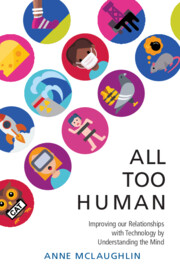Book contents
- All Too Human
- All Too Human
- Copyright page
- Contents
- Figures
- Tables
- Preface
- Acknowledgments
- Introduction
- 1 “Brace for Impact”
- 2 Bad Water
- 3 Hybrid Vigor
- 4 A Mind Divided
- 5 All the Light We Cannot See
- 6 Mistakes
- 7 History Repeating?
- 8 Needles in Haystacks
- 9 Apt Pupils and Alien Invaders
- 10 A Relative to Truth
- 11 Old Principles for New Worlds
- Conclusion
- Notes
- References
- Index
4 - A Mind Divided
Published online by Cambridge University Press: 27 January 2022
- All Too Human
- All Too Human
- Copyright page
- Contents
- Figures
- Tables
- Preface
- Acknowledgments
- Introduction
- 1 “Brace for Impact”
- 2 Bad Water
- 3 Hybrid Vigor
- 4 A Mind Divided
- 5 All the Light We Cannot See
- 6 Mistakes
- 7 History Repeating?
- 8 Needles in Haystacks
- 9 Apt Pupils and Alien Invaders
- 10 A Relative to Truth
- 11 Old Principles for New Worlds
- Conclusion
- Notes
- References
- Index
Summary
The emphasis of this chapter is on multitasking (and why we are so terrible at it). The everyday examples carried through the chapter are “things we do while driving” - eating, listening to media, talking, and yes - texting. After a few stories about driving I describe the fascinating research on distracted driving - with the conclusion that talking on a cell phone harmed the attention we need for driving, not physically holding the phone. This research resulted in legislation against driving while using hands-free phones as well as handheld, and more importantly explained why talking on a cell phone caused accidents. A series of experiments on distraction follows, each new answer leading to another unexpected question in a science detective story. This leads into a discussion of how to predict which multitasking situations are harmful and which ones we’ll probably be good at (with accompanying graphics). The closing example is a description of NASA'S MIDAS system, which can be programmed with the different multiple tasks we expect a person to do and will run a simulation showing exactly when and how they will make us fail (prompting either regulation, a redesign of the task, or the hiring of more people so jobs can be distributed).
- Type
- Chapter
- Information
- All Too HumanUnderstanding and Improving our Relationships with Technology, pp. 42 - 52Publisher: Cambridge University PressPrint publication year: 2022

